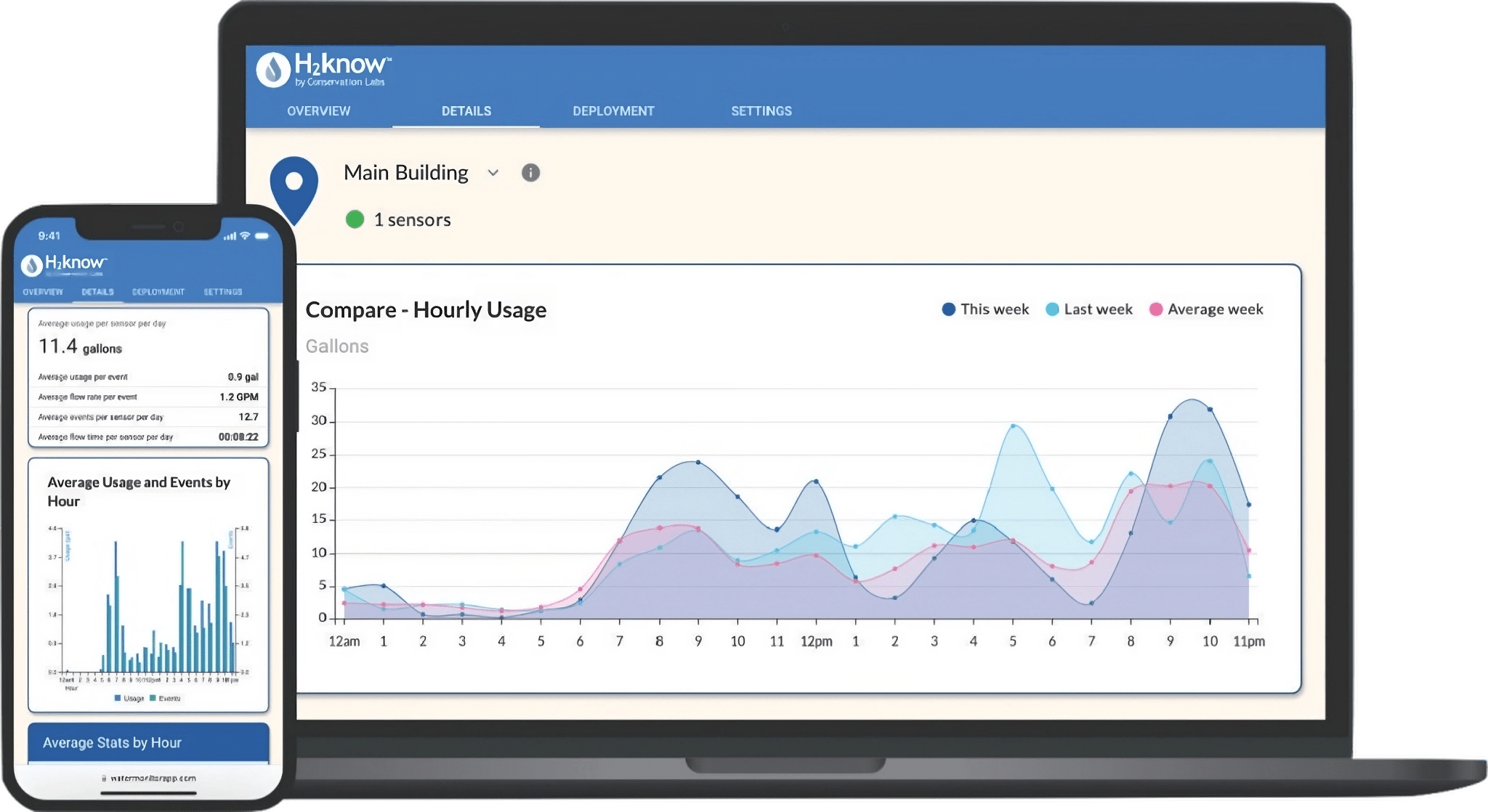Sound can reveal a lot about water — and where it’s headed.
Every washing machine cycle, dish rinse and toilet flush sends water rushing through the pipes in homes, apartments and commercial buildings, carrying waste away at breakneck speeds. The whistles and hums that water makes along its downward journey may seem unremarkable. But they’re bits of a unique sound signature that, using the right algorithms and hardware, can be detected and categorized for preventative maintenance purposes.
Acoustic detection, as it’s called, isn’t a new science. Water authorities and utilities have used acoustic sensors to canvas for leaks and signs of wear and tear for years. But within the past decade or so, an emerging cohort of startups has put interesting twists on the old tech, applying acoustic water detection in novel ways — and places.
One of these startups, Conservation Labs, is creating a water-listening sensor that attaches to the plumbing in residential, multifamily and office properties. Leveraging an algorithm trained on water acoustics, the sensor translates sounds from the pipes into usage statistics, leak alerts and even conservation recommendations.
“The sensors can monitor individual units or entire buildings, providing remote visibility,” Mark Kovscek, the founder and CEO of Conservation Labs, told TechCrunch in an email interview. “There are several indirect competitors that identify leaks or monitor whole-building consumption. But Conservation Labs’ technology is differentiated in that it both detects leaks and monitors water usage for any building and pipe.”
Kovscek, who has a degree in applied mathematics and industrial management from Carnegie Mellon, was inspired to launch Conservation after suffering a few bad house leaks.

“After the [leaks], I looked around for a product that could monitor leaks and other water usage, but wasn’t able to find one that created value,” Kovscek said. “I realized that sound waves could be indicative of what was going on in the pipes, developed a prototype and filed a patent in 2016.”
Today, Conservation Labs — which earlier this month raised $7.5 million in a Series A funding round led by RET Ventures’ Housing Impact Fund with participation from Sustain VC — sells sensors and a subscription to a cloud-based monitoring service. The sensors retail for $129, while the subscription costs $36 per sensor per year.
Kovscek claims that Conservation users typically see a 20% reduction in water usage after installing the sensors. But as with many — if not most — AI- and algorithm-driven products on the market, it’s tough to know exactly how well Conservation Labs’ tech performs without extensively testing it first.
There are lots of variables involved in acoustic monitoring, like the volume of water being monitored and the material of the pipes — all of which could affect a sensor reading. Depending on which sounds and how many Conservation used to train its algorithms, unintentional bias could creep in — skewing the readings.
For his part, Kovscek asserted that Conservation has a “rigorous” approach to development, testing and validating algorithms and that the platform is continuously improving in terms of its accuracy.
“General acoustic models are created with thousands of hours of data and then sensor-specific models are generated based on the unique environment of the sensor and the unique audio profile of the monitored object,” he added. “As the platform matures and adds new use cases, it becomes more intelligent, faster and even more extensible to new use cases.”
Conservation appears to have carved out a niche for itself in any case, reaching “seven digit” annual recurring revenue in 2023 and a customer base of around 150 companies. Seeking to avoid putting all of its eggs in one basket, the startup recently launched a new acoustic sensor line that monitors not only water but industrial machines for signs of damage and other related issues.
Like water-listening sensors, acoustic sensors that monitor machines is well-established tech.

Beyond Conservation Labs, startups like Noiseless Acoustics and OneWatt use AI-powered sensors to better understand the patterns of industrial equipment. Others — including Conservation — have experimented applying them to identify leaks in gas and oil pipelines.
“Conservation’s platform can not only identify if a machine is malfunctioning, but identify the reason for the malfunction (e.g., is it the motor belt, motor bearing, is the machine unbalanced, etc.),” Kovscek said. “All of this is accomplished with a single sensor that uses a low-cost microphone.”
Once again, take those claims how you will; this writer didn’t — and won’t — have the chance to put them to the test.
With a war chest totaling $9.5 million in venture capital, Conservation plans to release the second generation of its water monitoring sensor, increase the scope and scale of its AI platform and expand its ongoing sales and marketing initiatives. To achieve all this, the Pittsburgh, Pennsylvania-based company intends to hire eight people by the end of the year, growing its 22-person team to 30.
“In sustainability, there’s a number of tailwinds, including a drive for more efficient operations, federal funding for climate and energy investment, regulations to encourage water and energy monitoring, increasing water rates and consumer interest in eco-friendly brands,” Kovscek said. “We’re focused on looking ahead — this Series A is a testament to the resiliency of our offering, regardless of what’s happening in the broader market.”































Comment